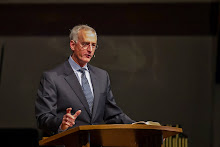Glenn Wagner has written a book entitled Escape from Church, INC.: The Return of the Pastor-Shepherd. He wrote the book at a time in which there was a growing movement which viewed churches from a corporate model and pastors as CEO’s. Wagner tells the story of a pastor who was approached by a member following a sermon in which he repeatedly referred to elders as shepherds. The individual’s concern was that no one in our day understands shepherds and sheep and the pastor needed to replace his ancient culture language with a more modern analogy. The pastor took up his friend’s challenge but came to the conclusion that there was no modern metaphor that was suitable. This is what he told this member: “I can’t find any figure equivalent to the shepherd idea in our modern, urban world. Besides, if I drop the shepherd and flock idea, I would have to tear about five hundred pages out of my Bible, plus leave the modern church with a distorted – if not neutered – view of spiritual leadership” (Glenn Wagner, Escape from Church, INC.: The Return of the Pastor-Shepherd, pages 112-113).
Do you recall the words of Jesus to Peter in John 21? Jesus asked Peter three times, do you love me? After each affirmative answer by Peter, Jesus told him to feed and tend Christ’s sheep. Whether you like the analogy or not, Scripture is filled with this analogy in which the people of God are pictured as sheep. The most famous and perhaps beloved chapter in the entire Bible, Psalm 23, paints this picture: The Lord is my Shepherd. What does a shepherd do for his sheep? He cares for, loves, watches over, guards, feeds, and leads his sheep. The concepts of feeding and guarding are prevalent thoughts in the Pastoral Epistles. The focus in I Timothy is guarding the truth against those who would lead the sheep astray by feeding the people of God with his truth. The elder must be able to teach. So much is said in these three books about the teaching and preaching of the Scriptures which feeds the people of God.
Elders must have a deep love and spiritual concern for the people of God so that they minister according to the needs of the people. After all, the sheep belong to Christ, the Great Shepherd, who laid down his life for us.
Monday, June 6, 2011
Friday, June 3, 2011
Tim Challies' Recommendation of our Book
Elder Governance: Insights into Making the Transition by Daniel Evans & Joseph Godwin. This book speaks about making the sometimes-difficult transition from a board-run church to a church governed by elders. Here is the publisher’s description: “When the leadership of Patterson Park Church looked for a book explaining the process of transitioning from a board-run church to an elder led form of church government, a structure they had come to believe was more in line with Scripture, they found none. God honored their efforts and two of their elders decided a book still needed to be written. Elder Governance: Insights into Making the Transition examines church government from a biblical and historical context and tells the story of Patterson Park’s transition. The authors are hopeful that God will use their experience to help others considering such a transition.” It comes endorsed by R. Kent Hughes, James Grier and Alexander Strauch.
Subscribe to:
Posts (Atom)
